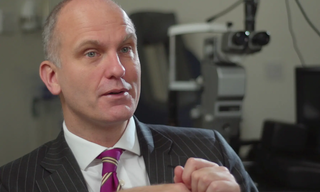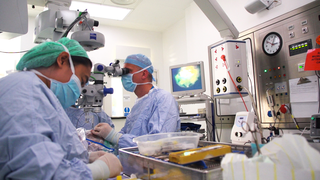Choroideremia Gene Therapy Improves Vision in Human Study
Eye On the Cure Research News
Researchers were able to improve vision in five of six people with choroideremia participating in a clinical trial.

Dr. Robert MacLaren, lead investigator for the study. Pictures courtesy of University of Oxford.
The development of retinal-disease gene therapies took a monumental step forward on January 16 with a report in The Lancet that researchers were able to improve vision in five of six people with choroideremia participating in a clinical trial.
Patients in the University of Oxford study in the United Kingdom were delighted with the results. One gentleman saw stars in the sky for the first time in many years. Another was able to see soccer matches more clearly on television. I was very excited to see dozens of online and print media from around world — including The Wall Street Journal — cover the outstanding results of the cutting-edge research. We, at the Foundation, also posted an in-depth article on the trial on our website. The photo below shows Robert MacLaren, M.D., the surgeon and lead investigator for the study, performing the delicate procedure of injecting the gene therapy under the patient's retina.
The fact that this treatment has performed safely and effectively thus far is not only great news for people with choroideremia, it affirms that gene therapy is a highly promising approach for saving and restoring vision in those with a broad range of retinal diseases. Keep in mind that we still don't know how well this and other gene therapies will slow the progress of retinal degeneration in the long term — we need more data over several years to make that determination.

But at this juncture, retinal gene therapies have built a nice track record, and the knowledge gained from the choroideremia study boosts the prospects for success of human studies underway for retinitis pigmentosa (RP), Leber congenital amaurosis, Stargardt disease, Usher syndrome, and age-related macular degeneration. The results also bode well for the many retinal gene therapy clinical trials scheduled to launch in the coming few years.
An important aspect of the choroideremia treatment is that it's one of the first gene therapies to target photoreceptors, the cells that make vision possible and are often affected in RP and other prevalent retinal conditions. Most other current clinical trials involve treatment of the retinal pigment epithelium, a supportive layer of cells adjacent to photoreceptors.
The success of the study validates painstaking lab work performed by Foundation-funded scientists worldwide. The path to the University of Oxford choroideremia trial was by no means a cakewalk. It took 20 years to get there. Much of the innovative work was performed by Miguel Seabra, M.D., Ph.D., who received more than $1.5 million from the Foundation for his efforts.
So what did it take to reach the clinical trial? The first step was to find the gene, which, when mutated, causes the disease. CHM was identified as the culprit in 1993. Then there was the work to understand why defects in the gene cause vision loss. Next was the development of a choroideremia mouse model, which was particularly tricky with this disease, because knocking out the CHM proved fatal.
Subsequently, the gene therapy was developed and tested in cleverly engineered mice — i.e., mice with choroideremia that lived! — to demonstrate that it was safe and saved vision. Finally, toxicology and safety tests were performed to gain regulatory authorization for human studies.
Two other choroideremia gene therapy clinical trials are scheduled to begin in 2014. Ian MacDonald, M.D., will soon launch a study at the University of Alberta in Edmonton, Canada. Jean Bennett, M.D., Ph.D. — who recently advanced her LCA gene therapy trial into Phase III at the Children's Hospital of Philadelphia and the University of Iowa — is hoping to begin her choroideremia human study this summer.
For patients, families and researchers, fighting blindness remains a long and challenging journey. There's no rest for the weary. So, for those actively involved in our cause, I hope you will take a moment to celebrate this victory. At the end of the day, this win was not possible with the sustained support of the Foundation's family.




